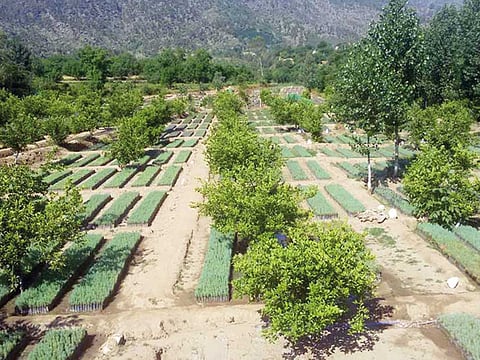Pakistan’s ‘Billion Tree Tsunami’ surpasses Bonn challenge commitment
Cricket star turned politician Imran Khan launched the green initiative in Khyber Pakhtunkhwa province

Islamabad: Pakistan’s province of Khyber Pakhtunkhwa (KP) has reached a new milestone by planting one billion trees in two years, exceeding a global commitment of restoring 350,000 hectares of forests and degraded land.
This green initiative was launched by cricket star turned politician Imran Khan, who heads the Pakistan Tehreek-e-Insaf (PTI) political party, in an effort to restore forests lost to natural disasters and years of tree-cutting.
The Billion Tree Tsunami project aims to slow down the effects of global warming in Pakistan which ranks seventh on the list of the countries mostly likely to be affected by climate change. Pakistan also has one of the highest deforestation rates in Asia with less than 3 per cent forest cover.
About 40 per cent of the remaining forests are in the north-western province of KP which makes the campaign ever more significant.
Imran Khan hopes the reforestation drive will diminish the effects of global warming.
“If you plant trees, we have discovered, by the river banks it sustains the rivers. But most importantly, the glaciers that are melting in the mountains, and one of the biggest reasons is because there has been a massive deforestation. So, this billion tree (campaign) is very significant for our future” Khan said.
In his speech on the eve of Pakistan’s 70th Independence Day, Khan vowed to turn the country into “Green Pakistan” by widespread plantation.
In June 2015 the PTI-led government of Khyber Pakhtunkhwa announced the massive tree planting campaign to turn the tide on land degradation in formerly forested province and it was completed this month ahead of the deadline set for December 2017.
The campaign helped KP province fulfil its 348,400 hectare commitment to the Bonn Challenge – a global effort to restore 150 million hectares of world’s deforested and degraded by 2020 and 350 million hectares by 2030. Pakistan
“This marks the first Bonn Challenge pledge to reach its restoration goal” reads a statement by the International Union for Conservation of Nature (IUCN).
The organisation congratulated the KP province government on reaching a “momentous milestone”. Inger Anderson, Director General of IUCN remarked: “The Billion Tree Tsunami initiative is a true conservation success story, one that further demonstrates Pakistan’s leadership role in the international restoration effort and continued commitment to the Bonn Challenge,” says.
The plantation work was focused along the area beside the Gambila River, in the Bannu District, which was a barren wasteland in 2013 and is now a thriving forest. The newly planted trees are reinforcing riverbanks near Indus, Kunhar and Swat rivers and are also improving biodiversity.
“The project is naturally restoring a previously deforested landscape, which will assist in meeting present and future needs and offers multiple benefits for climate adaptation and mitigation in a very climate-vulnerable province,” says Muhammad Tehmasip, Project Director of the Billion Tree Tsunami.
The green project has achieved its restoration target through a combination of protected natural regeneration (60 per cent) and planned afforestation (40 per cent) in the province. Additionally, it has established 13,000 private tree nurseries, which have already boosted local incomes, generated thousands of green jobs, and empowered unemployed youth and women.
Experts at World Wildlife Fund-Pakistan believe the campaign has been an environmental, economic and social success, with one of the highest survival rates of trees in the world.
“The project is creating Pakistan’s best natural defence against climate change while also providing green jobs as well as a sustainable future for KP. Additionally it is aiding the global fight against global warming by sequestering carbon in the expanding forests. This global recognition is a landmark for both KP and Pakistan” said Malik Amin Aslam, Chair of KP’s Green Growth initiative.
The KP government has so far invested US$123 million (Dh451 million) in the project and will allocate an additional US$ 100 million to maintain the project through June 2020. “This support makes the project one of the largest eco-investments ever made in Pakistan,” according to the IUCN.



